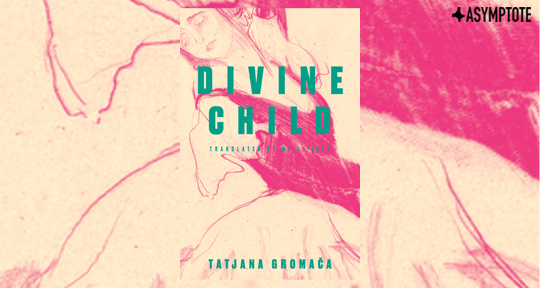Tatjana Gromača’s contemporary novel Divine Child centers on the narrator’s relationship with her mother, whose bipolar disorder diagnosis coincides with a startling descent into Croatian nationalism. The book earned the Croatian Ministry of Culture’s 2012 Vladimir Nazor Prize of the for the best work of prose and Jutarnji list’s Novel of the Year prize in 2013. Yugoslav émigré writer Bora Ćosić called Divine Child “a small masterpiece” and stated that the author stands out for her “precious crudity”—a reference to its often stark, earthy descriptions despite the prevailing poetic and philosophical vein. Divine Child will be released in North America by Sandorf Passage in October 2021. Here, translator Will Firth describes challenges he encountered along the way.
In 2020, I was commissioned by Zagreb publisher Sandorf to translate three books of contemporary fiction by Croatian writers with funding from the EU’s Creative Europe program. One of them was the short novel Divine Child (Božanska dječica) by Tatjana Gromača. I had not read anything substantial of hers before.
I immediately related to Divine Child. It’s a diarylike biography of the author’s mother, which focuses on her slide into bipolar disorder, when she is cold-shouldered and denigrated by society. It makes an important link between socioeconomic crises—the collapse of former Yugoslavia, accompanied by virulent nationalisms—and the individual. The mother’s Croatian-ethnic neighbors label her an undesirable minority, in this case an ethnic Serb, although she has spent all her life in Croatia and shows few, if any, signs of otherness. But this was a time when having the “wrong” name could cause you problems throughout the region, and arguably still can. The exclusion triggers the mother’s illness.
The poignant novel is imbued with anguish rather than heated rage—both emotionally charged and deeply analytical. As a review in Publishers Weekly noted, it “takes on the hatred that was manufactured, mythologized, and manipulated to feed, justify, and rationalize violence.”
The title—Divine Child—is a dual reference: to the mother’s turn to religion in later life, and to the formative influence of her disciplinarian father, a military man, whose expectations she always strove to fulfill, even after his death, thus making her something of an “eternal child.” Typical of literature from the region, character development is sparse, even with the central character of the mother, and we have to piece together her appearance, occupation, and family history from a range of allusions and asides. Setting her in a historical and social context is more important for the author and omniscient narrator, and the reader is free to decide whether this sparseness is an exquisite literary pleasure or unnecessarily tantalizing suspense.
The editor of the English edition, Buzz Poole, was not convinced by the looseness of the narration in combination with its poetic style and philosophical ambit, so he made a major structural intervention: the novel in translation begins with an event central to the story—a visit to Mother at the hospital. This directs the flow and helps transport the author’s delicate voice. As translator, I was a go-between in negotiating this significant change.
Inconsistencies in the original also put me in the role of editor, and I collaborated with Gromača to tighten the language in translation. I like to correspond with authors to check my understanding of the text, even when I’m pretty sure how I’m going to render a particular term or phrase. With Divine Child, Gromača and I exchanged quite a few emails. We got on well and were on the verge of meeting up in the fall of 2020, when I was at a residency in Zagreb, but the worsening pandemic foiled our plans. In any case, our good working relationship was important for facing the challenge of translating this novel.
The main difficulties in translating Divine Child were to do with its startling imagery and metaphors. Here are several examples:
Frigid Sphinxes
Gromača describes packs of stray dogs in her hometown that “roamed the streets (…) and floated in abandoned fishing boats like frigid sphinxes with piercing, hypnotic eyes.” The original conveys this image as “poput pomodrjelih sfingi,” i.e., like sphinxes that have turned blue. I wasn’t sure in what sense the author meant “blue”—I thought it could refer to the bluish light by the river and the silhouettes of dogs in the twilight. In fact, she meant that the dogs have literally turned blue from the damp cold on the riverbanks and also from their lowly thoughts and those of the surrounding human society. “Frigid” conveys that physical and spiritual cold. READ MORE…

